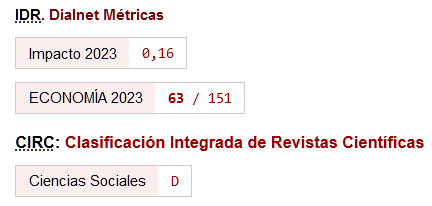Profits without investment in financial capitalism. a marxist explanation of the appearances
Keywords:
financialization, globalization, profits, investment, competitionAbstract
Heterodox economic theory asserts the existence of a positive relationship between investment and profits. In the last thirty years, however, investment has decreased despite the rising profitability of capital. The usually argued causes of this phenomenon disregard the classical approach towards competition and capitalism. To criticize these theories on this account and to give an alternative explanation, under a Marxist approach, is the purpose of this paper. The conclusions are different to the most common ones: financialization is not the result of any problem in the functioning of capitalism but an expression of its normal development. Consequently, the recovery of investment in western countries is not possible through the regulation of finance.
Downloads
References
Astarita, Rolando (2008): "Crítica de la tesis de la financiarización", Documento de trabajo. Disponible en: http://www.rolandoastarita.com/dt-Critica%20tesis%20de%20la%20financiarizacon.htm
Auerbach, Paul (2016): Socialist Optimism: An Alternative Poltical Economy for the 21st Century, Londres: Palgrave Macmillan.
https://doi.org/10.1007/978-1-137-56396-5
Bakir, Erdogan y Campbell, Al (2010): "Neoliberalism, the Rate of Profit and the Rate of Accumulation", Science & Society, Vol. 74, Nº 3, pp. 323-342.
https://doi.org/10.1521/siso.2010.74.3.323
Basu, Deepankar y Das, Debarshi (2016): "Profitability and Investment: Evidence from India's Organized Manufacturing Sector", Metroeconomica, Vol. 68, Nº 1, pp. 47-90.
https://doi.org/10.1111/meca.12126
Basu, Deepankar y Ramaa, Vasudevan (2013): "Technology, distribution and the rate of profit in the US economy: understanding the current crisis", Cambridge Journal of Economics, Vol. 37, Nº 1, pp. 57-89.
https://doi.org/10.1093/cje/bes035
Bowles, Samuel y Boyer, Robert (1995): "Wages, aggregate demand, and employment in an open economy: an empirical investigation", en G. Epstein y H. Gintis (eds.): Macroeconomic Policy after the Conservative Era. Studies in Investment, Saving and Finance, Cambridge: Cambridge University Press, pp. 143-171.
Brewer, A. (1990): Marxist theories of imperialism, Londres: Routledge.
Carcherdi, Guglielmo (2011): "Behind and beyond the crisis", International Socialism, Nº 123.
Duménil, Gerard y Lévy, Dominique (2004a): Capital resurgent, Cambridge: Harvard University Press.
Duménil, Gerard y Lévy, Dominique (2004b): "Neoliberal Dynamics: Toward a New Phase?: Documento de trabajo. Disponible en: http://www.cepremap.fr/membres/dlevy/dle2004c.htm
Galbraith, James K. (1975): Economics and the Public Purpose, Harmondsworth: Penguin Books.
Goldstein, Adam (2012): "Revenge of the Managers: Labor Cost-Cutting and the Paradoxical Resurgence of Managerialism in the Shareholder Value Era, 1984 to 2001", American Sociological Review, Vol. 77, Nº 2, pp. 268-294.
https://doi.org/10.1177/0003122412440093
Guerrero, Diego (1995): Competitividad: teoría y práctica, Barcelona: Ariel.
Hein, E. y Mundt, M. (2012): "Financialisation and the requirements and potentials for wage-led recovery - a review focussing on the G20", Artículo escrito para el proyecto 'New perspectives on wages and economic growth: the potentials of wage-led growth'.
Hisrt, Paul y Thompson, Grahame (1996): Globalization in Question, Cambridge: Polity Press.
Husson, Michel (2009): Financial crisis or crisis of capitalism? Documento de trabajo. Disponible en: http://hussonet.free.fr/denkeng9.pdf
Kliman, Andrew (2007): Reclaiming Marx's Capital: a refutation of the myth of inconsistency, Lanham, MD: Lexington Books.
Kliman, Andrew (2011): The Failure of Capitalist Production: Underlying Causes of the Great Recession, London: Pluto press.
Lapavitsas, Costas y Mendieta-Muñoz, Ivan (2016) "The Profits Of Financialization", Monthly Review, Vol. 68, Nº 3.
https://doi.org/10.14452/MR-068-03-2016-07_4
Lavoie, Marc (2014): Post-Keynesian economics, Northampton, MA, USA: Edward Elgar.
Marx, Karl (2000): El capital: crítica de la economía política, Pinto, Madrid, Espanya: AKAL.
Marx, Karl y McLellan, David (2000): Karl Marx: Selected Writings. 2ª ed., Londres: Oxford University Press.
Marx, Karl (2016): Trabajo asalariado y capital, CreateSpace Independent Publishing Platform.
Mateo, Juan Pablo (2010): "Critica a la tesis de la financiarización como teoría de la crisis. Un intento de caracterización teórica", Borrador para la discusión, Jornadas de Economía Crítica, 11, 12 y 13 de febrero, Zaragoza, España. Disponible en: https://marxismocritico.files.wordpress.com/2012/02/crc3adtica-de-latesis-de-la-financiarizacic3b3n.pdf
Mateo, Juan Pablo (2015): "La Financiarización Como Teoría De La Crisis En Perspectiva Histórica", Cuadernos de Economía, Vol. 34, Nº 64, pp. 23-44.
https://doi.org/10.15446/cuad.econ.v34n64.45838
Milios, John y Sotiropoulos, Dimitris (2009): Rethinking imperialism. Basingstoke, England: Palgrave Macmillan.
https://doi.org/10.1057/9780230250642
Onaran, Ozlem y Galanis, Giorgos (2013): "Income Distribution and Aggregate Demand: A Global Post Keynesian Model", Working Papers wp319, Political Economy Research Institute, University of Massachusetts at Amherst.
Orhangazi, Özgür (2008): "Financialization and capital accumulation in the non-financial corporate sector: A theoretical and empirical investigation on the US economy: 1973-2003", Cambridge Journal of Economics, Vol. 32, Nº 6, pp. 863-886.
https://doi.org/10.1093/cje/ben009
Palley, Thomas (2007): "Financialization: What It Is and Why It Matters" Economics Working Paper, Archive wp_525, Levy Economics Institute.
https://doi.org/10.2139/ssrn.1077923
Polanyi, Karl (1957): The great transformation. Boston: Beacon Press.
Roberts, Michael (2011): "Measuring the rate of profit; profit cycles and the next recession", Artículo presentado en la 13a Conferencia de la Association for Heterodox Economics (AHE): July, 2011.
Shaikh, Anwar (2016): Capitalism. New York: Oxford University Press.
Shaikh, Anwar (2011): "The first Great Recession of the 21st century", Socialist Register, Vol. 47, pp.44-63.
Shaikh, Anwar (1978): "An introduction to the history of crisis theories", in: US Capitalism in Crisis, New York: U.R.P.E.
Shaikh, Anwar (1979): "Foreign Trade and the Law of Value: Part I", Science & Society, Vol. 43, Nº 3, pp. 281-302.
Shapiro, Nina (1988): "The Firm and its Profits", Documento de trabajo Nº 2. Disponible en: https://papers.ssrn.com/sol3/papers.cfm?abstract_id=191369
Stockhammer, Engelbert (2004): "Financialization and the slowdown of accumulation", Cambridge Journal of Economics, Vol. 28, Nº 5, pp. 719-741.
https://doi.org/10.1093/cje/beh032
Stockhammer, Engelbert (2006): "Shareholder value orientation and the investment-profit puzzle", Journal of Post Keynesian Economics, Vol. 28, Nº 2, pp. 193-215.
https://doi.org/10.2753/PKE0160-3477280203
Stockhammer, Engelbert (2010): "Financialization and the Global Economy", Working Papers wp240, Political Economy Research Institute, University of Massachusetts at Amherst.
Suwandi, Intan y Foster, John B. (2016): "Multinational Corporations and the Globalization of Monopoly Capital: From the 1960s to the Present", Monthly Review, Vol. 68, Nº 3.
https://doi.org/10.14452/MR-068-03-2016-07_9
Tapia, Jose A. (2012): "Does Investment Call the Tune? Empirical Evidence and Endogenous Theories of the Business Cycle", Research in Political Economy, Vol. 28, pp. 229-259.
https://doi.org/10.1108/S0161-7230(2013)0000028009
Teulings, Coen y Baldwin, Richard (2014): Secular Stagnation. United Kingdom: Centre for Economic Policy Research.
Wood, Ellen (2002): The origin of capitalism: a longer view. London: Verso.
Downloads
Published
How to Cite
Issue
Section
License
This licence allows third parties to share (copy and redistribute the material in any medium or format) and adapt (remix, transform and create from the material for any purpose, including commercial purposes), provided that authorship and first publication in this journal (The Journal, DOI of the work) is acknowledged, a link to the licence is provided, and it is stated whether changes have been made to the work.







